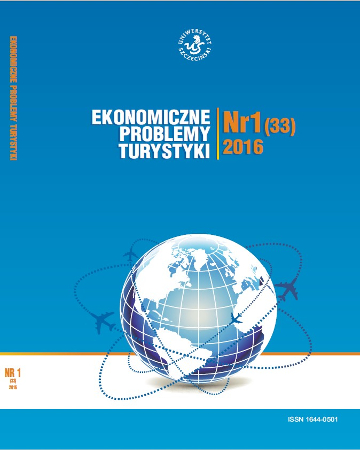
ISSN: 1644-0501
eISSN: 2353-3188
OAI
DOI: 10.18276/ept.2016.1.33-07



Issue archive /
nr 1 (33) 2016
Foresight jako narzędzie rozwoju turystyki regionalnej – studium przypadku regionu Laponii (Finlandia)
(Foresight as a Tool in Regional Tourism Development – a Case Study of Tourism Foresight Project)
| Authors: |
Matylda
Awedyk
Akademia Wychowania Fizycznego w Poznaniu |
| Keywords: | Lapland Finland tourism planning regional tourism regional development foresight |
| Data publikacji całości: | 2016 |
| Page range: | 12 (81-92) |
Abstract
Foresight offers advantages in regional tourism development by helping tourism stakeholders to proactively anticipate futures´ changes and prepare for possible events. Foresight is a relatively new field of research in tourism research (e.g. Fernández-Güell & Collado, 2013; Kaynak & Kara, 2012; Varum et al, 2011). Therefore, the meaning of regional tourism foresight processes based on locally negotiated research and development themes has not been presented yet in tourism research. Foresight helps to anticipate customer needs, develop new services and keep up the attractiveness of tourism businesses and whole destinations.
Foresight is an important part of development processes because in contrast to the traditional planning process that normally has a limited scope of the sector foresight, through active participation, is gradually building an integrated vision of a possible future. Foresight takes into account a wide range of factors, thus building the coherent and plausible visions of the future. It also helps to formulate realistic and innovative tourism strategies that can accept the views of many stakeholders.
This study identifies advantages and challenges resulting from the application of foresight in regional tourism development in Finnish Lapland during the years 2010-2013. The empirical data consists of autoethnographic observation, participant feedback and quantitative and qualitative project reports. During the project foresight knowledge of tourism stakeholders increased and they learned to build futures images. New tourism products and co-operation possibilities were established. At the beginning benefits of foresight were not seen and it was difficult to understand the purpose and multidimensionality of long term foresight.
Download file
Article file
Bibliography
| 1. | Andriotis, K., 2007, A Framework for the Tourism Planning Process, w: Sustainability, Profitability and Successful Tourism, red. A. Raj, Kanishka Publishers, New Delhι. |
| 2. | Awedyk, M., 2015, Studia nad przyszłością rozwoju turystyki – foresight w planowaniu turystycznym, w: Kształcenie kadr dla gospodarki turystycznej i rekreacji. Stan obecny i prognozy, red. S. Bosiacki,, Akademia Wychowania Fizycznego im. E. Piaseckiego w Poznaniu, Poznań, s. 187–199. |
| 3. | Borodako, K., 2011, Foresight w turystyce. Bariery wykorzystania i rozwoju, C.H. Beck, Warszawa. |
| 4. | Cariola, M., Rolfo, S., 2004, Evolution in the rationales of foresight in Europe, Futures, nr 36, 1063-1075. |
| 5. | Cornish, E., 2004, Futuring: The Exploration of the Future, World Future Society, Betsheda. |
| 6. | Dwyer, L, Edwards, D., Mistilis, N., Roman, C., Scott, N., Cooper, C., 2008, Megatrends Underpinning Tourism to 2020. Analysis of key drivers for change, CRC for Sustainable Tourism Pty Ltd, Gold Coast. |
| 7. | Fernández-Güell, J.M., 2012, Foresight as an innovative tool for designing tourist destinations, w: Conference of the International Forum on Urbanism, 6th Conference of the International Forum on Urbanism (IFoU): Tourbanism, Barcelona, s. 1–11. |
| 8. | Kaynak, E., Karak, A., 2012, Assessing tourism market potential in a dynamic emerging economy: Theoretical and empirical insights from Cambodia. Asia Pacific Journal of Marketing and Logistics, nr 24 (2), s. 199–22. |
| 9. | Martin B., 2001, Technology Foresight in a Rapid Globalising Economy, UNIDO Regional Conference on Technology Foresight for Central and Eastern Europe and Newly States, Vienna. |
| 10. | McMaster, M., 1996, Foresight: Exploring the Structure of the Future, Long Range Planning, nr 29, s. 149–155. |
| 11. | Schwartz, P., 1991, The Art of Long View, Doubleday, New York. |
| 12. | Toedtling, F., 1994, The uneven landscape of innovation poles: local embeddedness and global networks, w: Globalization, institutions and regional development in Europe, red. A. Amin, N. Thrift, Oxford University Press, Oxford. |
| 13. | Varum, C.A., Melo, C., Alvarenga, A., Carvalho, P.S., 2011, Scenarios and possible futures for hospitality and tourism, Foresight, nr 13(1), s. 19–35. |
| 14. | Wilenius, M., 2008, Taming the dragon: how to tackle the challenge of future foresight, Business Strategy Series, nr 9 (2), s. 65–77. |
| 15. | www. matkailu.luc.fi, dostęp 10.05.2015. |